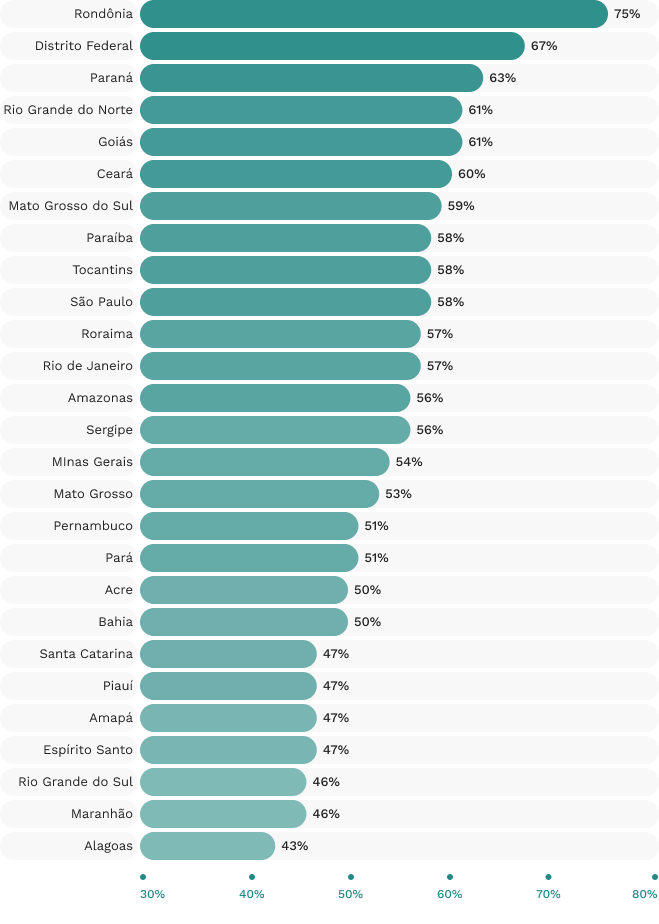July 2023, study conducted by Famivita with more than 2,500 participants between April 12 and 18, 2023: According to data from the International Society of Aesthetic Plastic Surgery, Brazil is the second country with the highest number of non-surgical procedures. At the top of the ranking is the application of botulinum toxin (botox) followed by hyaluronic acid—in the so-called "fillers". In addition, according to the latest survey by the Brazilian Society of Dermatology (SBD), in 2022, the number of aesthetic procedures increased by 390% compared to the previous year. SBD also reported that among those who underwent these procedures, 56% were women and 24% were men.
The social representation of old age is often associated with the way of dressing, wrinkles, and loss of vitality and energy in daily life. Especially for women, there seems to be more pressure to use beauty care to attenuate the effects of aging, since this is seen as something ugly and in need of beautification. On this subject, in our latest study, 55% of women said they consider aging to be difficult in Brazil, for a woman.
Do you think it is difficult for a woman to age in Brazil?
“Aging youthfully”
In this scenario, a youthful appearance emerges as essential for personal achievement, happiness, and the value society gives to women, reinforcing the search for strategies that combat the aging process, which is seen as undesirable and negative, as opposed to what is new and therefore considered positive.
It is no coincidence that the cosmetics market in Brazil is the third largest in the world, second only to the United States and Japan. There are countless products available, across a wide range of prices, promising beauty and health and ensuring closeness to the desired appearance for an aging that, paradoxically, is as youthful as possible. Relevant to the topic, in our study 77% of the women interviewed highlighted that there is greater pressure for women not to look their age.
- Especially women between 40 and 44 years old, responded positively, with 63%.
- Next were women in the age group between 35 and 39 years old, with 60%.
- Among those 25 to 29 years old, the number was 56%.
- Among men, 63% said that women are under greater pressure on this topic.
It is important to emphasize that among women with children, 58% reported this difficulty, compared to 50% of women without children. In the group of pregnant women and women trying to get pregnant, this number was 56% and 50% respectively. Furthermore, 46% of men agreed that aging in Brazil is difficult for a woman.
Do you believe there is greater pressure for a woman not to look her age?
Aging as a man
Wrinkles and gray hair, for example, tend to be seen very differently in men and women. For men, the idea remains that these are signs of intellectual maturity, experience, and charm. For women, however, it's as if they are careless, have low self-esteem or do not take care of themselves. In other words, socially, women are not allowed to age as men do: naturally.
Given this scenario, many women undergo expensive and painful treatments in an attempt to meet expectations. And, according to our study, 68% of women said that men are not pressured to look younger.
- Especially women aged 40 to 44 replied that yes, there is greater demand for female appearance, with 84%.
- Among women 50 or older, the number was also significant, at 83%.
- 55% of men replied that there is no pressure on them concerning youthfulness.
Ranking of states where participants pointed out greater pressure for women not to look their age
- 1.Rondônia
- 2.Pará
- 3.Federal District
- 4.Rio de Janeiro
- 5.Goiás
- 6.Bahia
- 7.Espírito Santo
- 8.Tocantins
- 9.São Paulo
- 10.Mato Grosso do Sul
- 11.Alagoas
- 12.Rio Grande do Norte
- 13.Pernambuco
- 14.Mato Grosso
- 15.Paraíba
- 16.Paraná
- 17.Minas Gerais
- 18.Amapá
- 19.Ceará
- 20.Santa Catarina
- 21.Sergipe
- 22.Roraima
- 23.Acre
- 24.Maranhão
- 25.Rio Grande do Sul
- 26.Amazonas
- 27.Piauí
Index of states where women said it is difficult for a woman to age in Brazil

Research Methodology
The study was nationwide and was conducted with over 2,500 participants between April 12 and 18, 2023. The data collection method was a questionnaire through an online form.
The following questions were addressed:
- Do you think it is difficult for a woman to age in Brazil?
- Do you believe there is greater pressure for a woman not to look her age?
- Do you believe that this type of pressure does not exist for men?
To compare the results between regions and states, the affirmative responses were counted numerically: 1 for “yes” and 0 for “no.” Some questions, aimed at obtaining more qualitative results, were designed with additional options.
